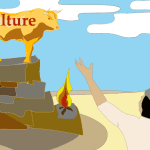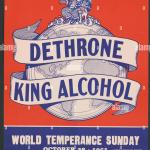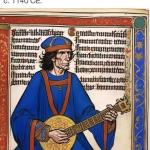According to Henri Frankfort’s summary, “The Mesopotamian myth of beginnings knew neither single origin nor single authority. The primeval chaos contained two elements, sweet water and salt water – the male Apsu and the female Tiamat. This couple brought forth a multitude of gods whose liveliness disturbed the inertia congenial to Chaos. So Chaos rose to destroy its progeny. In this conflict the older gods proved inadequate, and a young deity was chosen king. After his victory eh created the world as we know it.” Frankfort contrasts this with the serenity of Egyptian creation myths, with the world rising on the first morning.
Chaos’ attack on the gods led them to seek out a king to protect them. Tiamat and Apsu tried to respond, but only made Chaos mad:
“Angry, scheming, restless day and night
They are bent on fighting, rage and prowl like lions,
Gathered in council, they plan the attack.
Mother Hubur – creator of all forms
Adds irresistible weapons, has borne monster serpents,
Sharp toothed, with fang unsparing;
Has filled their bodies with poison for blood.
Fierce dragons she has draped with terror,
Crowned with flame and made like gods,
So that whoever looks upon them shall perish with fear,
And they, with bodies raised, will not turn back their breast . . .
When Anu approached and saw the mood of Tiamat
He could not stand before her and turned back.
He went in terror.”
Faced with this threat, the gods turned to Marduk for help.
“The lord raised up the floodstorm, his mighty weapon.
He mounted the chariot, the irresistible, terrifying cyclone . . . .
For his clothing he wore armor that inspires fright;
His head was covered with frightening radiance.
The Lord set out and pressed toward her,
Toward the place of raging Tiamat he set his face.
He held between his lips a talisman of red clay;
An herb to destroy the poison he grasped in his hand.
Then they crowded around him, the gods crowded around him;
The gods, his fathers, crowded around him, the gods crowded around him.”
Marduk slays them all, including Tiamat, and from the body of Tiamat, he forms land and sea. And because of his victory, he receives kingship among the gods, kingship by the consent of the governed:
“Thou, O Marduk, art our champion;
We gave thee kingship, power over all things.
Take thy seat in the council; may thy word prevail.
May thy weapon not yield, may it smite thy foes.
Grant breath of life to lords who put trust in thee.
But if a god embraces evil, shed his life.”
Thus kingship was established first among the gods, and then “Kingship descended from heaven,” specifically the royal insignia – headband and crown, scepter, staff. Frankfort says that this was the key notion of Mesopotamian kingship: “Kingship was a thing not of human origin but added to society by the gods; the king was a mortal made to carry a superhuman charge which the gods could remove at any time, to bestow it upon another.”
With this background, we can better understand the significance of Israel’s request for a king and Yahweh’s response to that request in 1 Samuel 8. First, it’s remarkable that Israel had existed for a couple of centuries as a nation before having a king. Moses was not a king, though there are some kingly aspects to his work and office, and at Sinai no king was established. Israel was constituted at Sinai as a kingdom of priests, but they were priests to the nations and priests to the divine king. They were household servants of King Yahweh, but King Yahweh ruled directly without a human representative. Throughout the period of judges, there was no king, and the book of Judges points not to the need for a human king but to the need for a divine king. At the center of Judges is a polemic against kingship, stories of Gideon and Abimelech. Israel can exist completely without a king, as she does again during the exile and after.
Second, 1 Samuel 8 is not a mythological account of the origins of kingship in Israel. The threat to Israel is a simple military threat from the Ammonites, and they respond with a political/military solution. There is no combat of the gods; the paraphernalia of kingship does not descend from heaven. Yahweh authorizes the kings, sending His Spirit on Saul and then David, and as in Mesopotamian kingship Yahweh withdraws His favor from Saul when Saul sins and resists. Samuel “demythologizes” and to some degree “secularizes” kingship.
Third, we can see why Yahweh would discern in this request a desire to overthrow Him as king. Wanting a king like the kings of the nations means wanting a king who is divine like Pharaoh, or one who guarantees the favor of the gods like the Mesopotamian kings. Yahweh sees the request as a request for a rival. Even after Israel has a king, she is supposed to trust Yahweh and Him alone.















